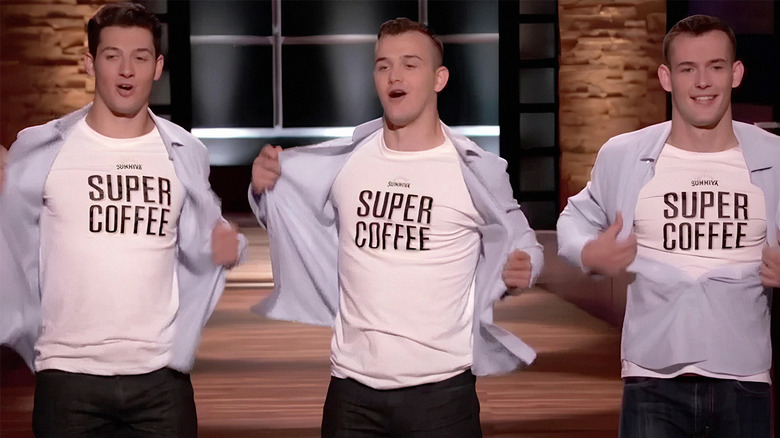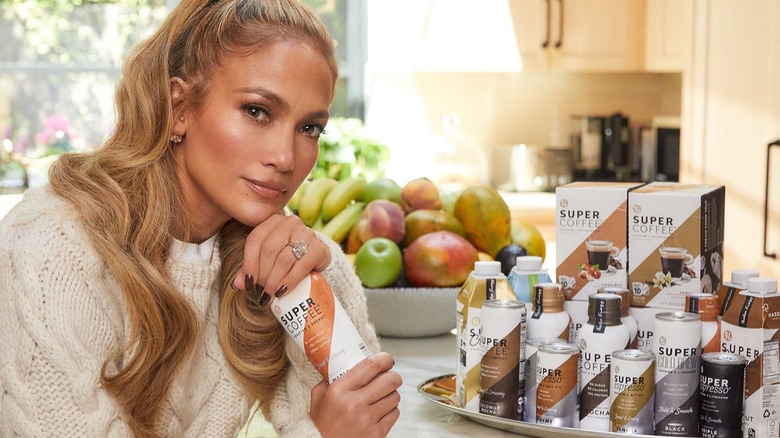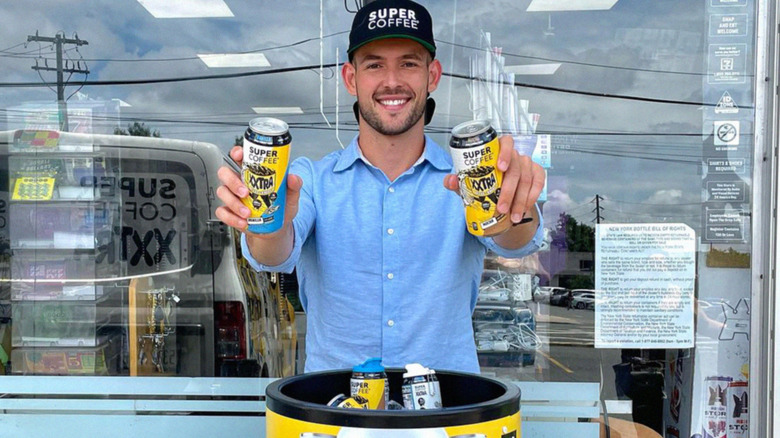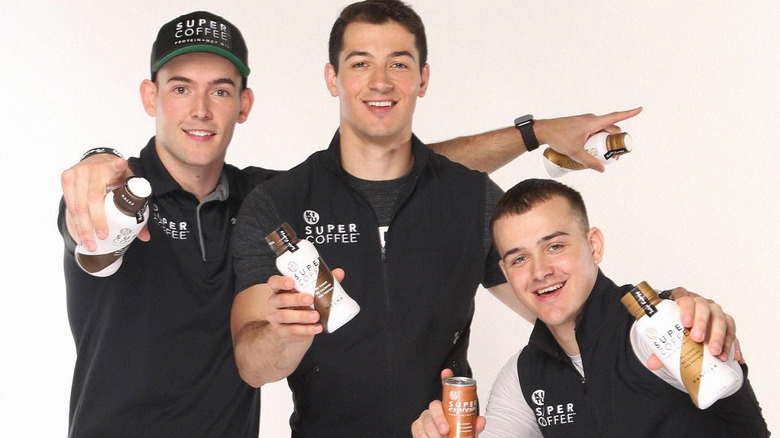Whatever Happened To Super Coffee After Shark Tank?
After an appearance on "Shark Tank," beverage company Poppi — previously called Mother — secured a sizable investment before expanding into a nationally successful brand. When brothers Jordan, Jake, and Jim DeCicco pitched the Sharks their proprietary bottled coffee brand, Super Coffee, on "Shark Tank" Season 9, Episode 22, they were surely hoping for the same sort of growth.
Before starting their business, all three DeCicco brothers were student-athletes. Youngest brother Jordan came up with the idea for Super Coffee at Philadelphia University as a solution for perpetual tiredness he would feel attempting to balance early morning training with his classes. Instead of purchasing sugary bottled coffee drinks, he concocted his own blend of coffee, protein, and coconut oil. This relatively healthy energy boost caught on with Jordan's basketball teammates, and he ultimately decided to team up with his brothers to bottle and sell the product.
As the siblings explain in their "Shark Tank" pitch, their drink was already on the shelves of some Whole Foods and Target stores in addition to a number of other major retailers before their TV appearance. The growth they sought, however, would require additional capital, hence their appeal to the Sharks.
What happened to Super Coffee on Shark Tank?
Jordan, Jake, and Jim DeCicco enter the "Shark Tank" studio, hoping to secure a $500,000 investment in exchange for 4.5% equity in their business. Both they and the Sharks know this is a big ask — at that point, their sales had totaled $400,000, and they suspected a total revenue of just over $2 million by that year's end. Of course, even that projection would fall well below the roughly $10 million valuation that led them to their desired investment.
Rohan Oza quickly singles out this discrepancy, while Robert Herjavec backs out immediately in response to the drink's taste. Meanwhile, Barbara Corcoran recalls investing in two beverage companies in the past and losing money each time. It's ultimately the taste, however, that prompts her to decline as well. Mark Cuban rejects their pitch after that, not liking the odds of a new entrant into the beverage industry. Finally, their self-valuation loses Lori Greiner before Oza backs out definitively.
The DeCiccos leave "Shark Tank" empty-handed. Fortunately for the business, its fruitless appearance kicked off what turned out to be a positive trajectory.
Super Coffee after Shark Tank
Super Coffee's "Shark Tank" episode first aired in February 2018. By 2020, the company was valued at $400 million, wildly exceeding both the DeCiccos' and the Sharks' projections.
Just one year after "Shark Tank," Jordan, Jake, and Jim DeCicco earned a joint spot on Forbes' annual 30 Under 30 list. Then, the company secured some celebrity investors, including names like Jennifer Lopez, Patrick Schwarzenegger, and Aaron Rodgers. The DeCiccos expanded their family venture into a company with 110 employees as of 2021, five years after their product first hit store shelves.
In 2021, Super Coffee hired Rosanna Godden as CFO. She previously worked as a senior manager for Starbucks and a vice president at Whole Foods. After she left the company in February 2022, board member Tyler Ricks first became the company's president before landing its CEO position. He helped grow numerous food and beverage companies in the past, including Peet's Coffee, Mighty Leaf Tea, and Lipton Tea. Meanwhile, Super Coffee also secured a partnership with Anheuser-Busch as a distributor. So, while the DeCiccos walked away from the "Shark Tank" studio no richer, they've experienced far more significant growth than what they sought during their on-air appearance.
Is Super Coffee still in business?
Super Coffee is now a major player in the pre-bottled coffee drinks industry as the third-largest business of its kind. The only two companies eclipsing its success are Starbucks and Dunkin'.
Currently, Super Coffee is available in more than 70,000 stores nationwide. Its flavor offerings have expanded well beyond what the DeCicco brothers showcased on "Shark Tank," ranging from simple options like vanilla or mocha to more complex ones like blueberry muffin and caramel waffle. Also joining their product lineup are a few spin-off drinks, including a canned, more explicitly energy drink-like alternative with added caffeine and an unflavored cold brew. Additionally, the company sells a separate line of Super Energy products (which contain caffeine from non-coffee sources) and a proprietary coffee creamer.
Another key development for the company under Tyler Ricks' leadership was its promotion of a subscription plan on Amazon, selling larger quantities at a reduced rate if customers commit to recurring purchases. By all accounts, Super Coffee is thriving to this day, more than five years after technically failing on "Shark Tank."
What's next for Super Coffee?
In 2021, Jordan DeCicco spoke to Strategy+Business magazine about the company's success, during which he shared some ideas for how it might grow in the future. Namely, expansion into new markets seems to be one of the core goals for Super Coffee in the present day. In the interview, DeCicco described Starbucks' bottled drinks as being available to 99% of consumers, whereas Super Coffee was an option for less than half of that number. "People buy what's there, whether they want to or not. We want to empower them with a choice," he said.
Meanwhile, DeCicco listed market share and longevity as potential areas of improvement. Regarding the former, he recounted a study determining that only 4% of consumers were aware of the Super Coffee brand name — a number he wanted to grow considerably. Regarding longevity, DeCicco hopes his business can stick around for the long haul, whatever it may take for that to happen. "We want this brand to live on for decades after we're done with it," he said, "whether that means partnering with large, established brands and putting it into their system, or going public."



